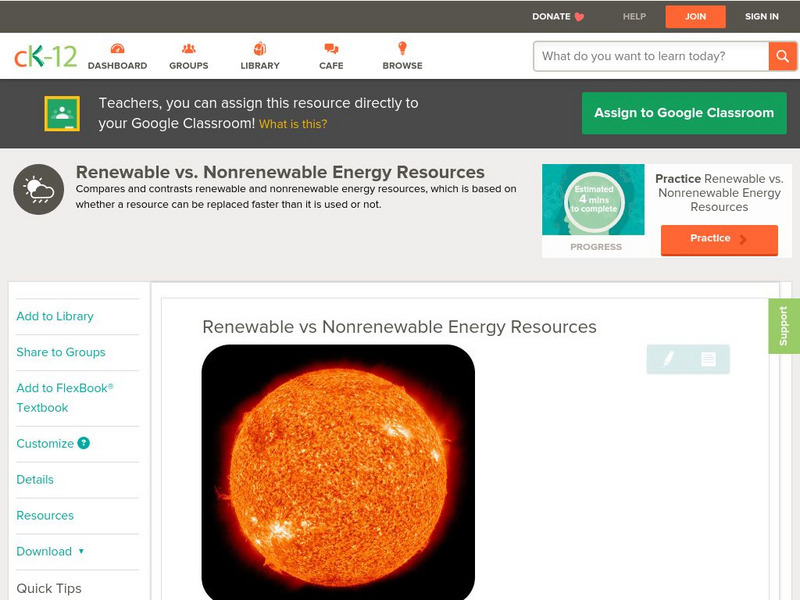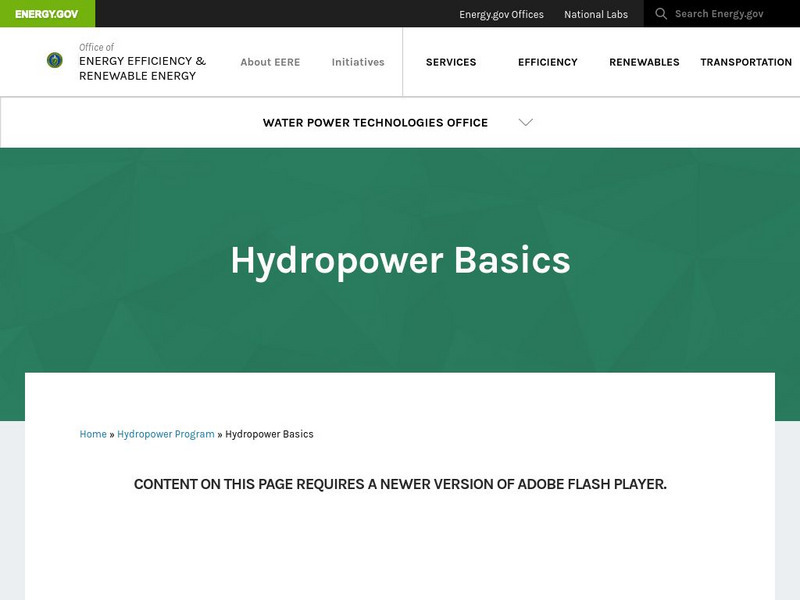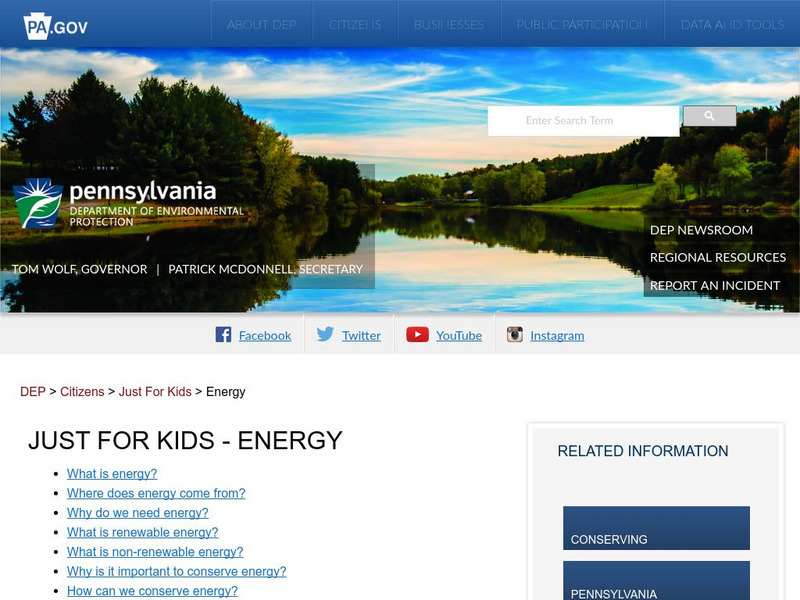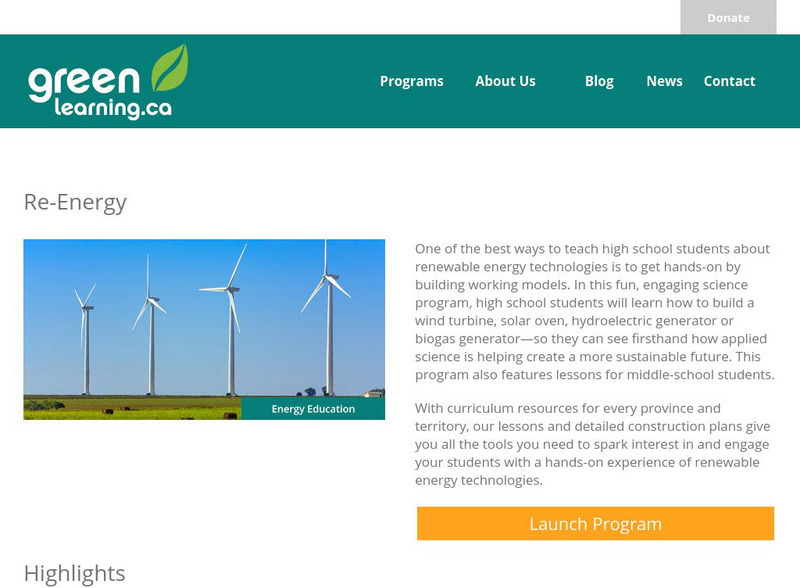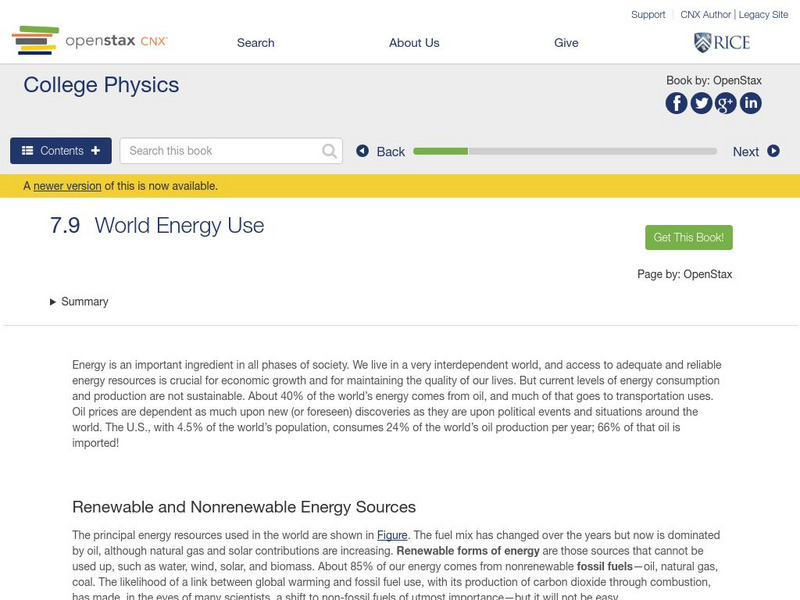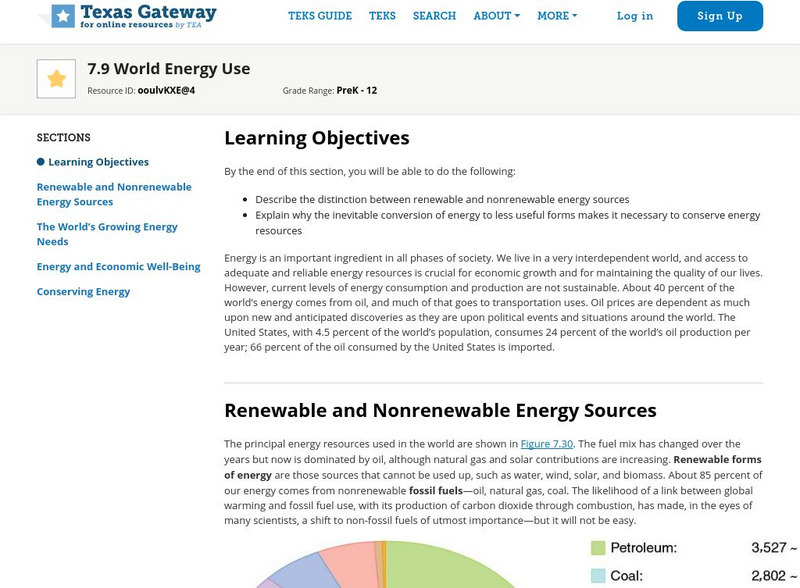CK-12 Foundation
Ck 12: Earth Science: Renewable vs. Non Renewable Energy Resources Study Guide
[Free Registration/Login may be required to access all resource tools.] Summarizes the key points about renewable and nonrenewable resources. Includes a few questions to check for understanding.
CK-12 Foundation
Ck 12: Earth Science: Renewable vs Non Renewable Energy Resources
[Free Registration/Login may be required to access all resource tools.] Compare and contrasts renewable and non-renewable resources.
CK-12 Foundation
Ck 12: Earth Science: Renewable vs Non Renewable Energy Resources
[Free Registration/Login may be required to access all resource tools.] Compare and contrasts renewable and non-renewable resources.
US Department of Energy
U.s. Department of Energy: Energy Basics: Renewable Energy: Biomass
Find out about the renewable energy resource using biomass technologies. Learn about the three main types of biomass and how the stored energy from the sun is captured for use.
US Department of Energy
U.s. Department of Energy: Energy Basics: Renewable Energy: Hydropower
Find out about renewable energy resources using hydropower technologies. Learn the history of use, and read about the benefits of utilizing water as a power source.
CK-12 Foundation
Ck 12: Earth Science: Non Renewable Energy Resources
[Free Registration/Login may be required to access all resource tools.] What nonrenewable energy resources and fossil fuels are and how they form, and the drawbacks of using nonrenewable energy resources.
Other
Pennsylvania Department of Environmental Protection: Just for Kids: Energy
Where does energy come from? What are non-renewable energy sources? How can we conserve energy? Learn the answers to these questions and more.
Canada Science and Technology Museum
Canada Science and Technology Museum: Background Information for Energy
Energy! What do you know about it? Use this terrific site to find out everything about it through a series of Q&As. Educators will find useful lesson plans at the related Teacher's site.
Other
Pembina Institute: Renewable Energy Lesson Plans
There are a variety of lesson plans here on solar and wind energy, and on sustainable transportation.
US Energy Information Administration
U.s. Eia: Energy Kids: Renewable Energy: Solar
This is a resource on solar energy, photovoltaic energy, solar thermal heat, solar thermal power plants and other forms of energy.
Other
Renewable Resource Data Center (R Re Dc)
This site provides information on renewable energy, including biomass resources, geothermal resources, solar resources, and wind resources.
PBS
Pbs Learning Media: Deciding Your City's Energy Future
Students learn about fossil fuels and renewable energy sources to help them decide which type of energy should be used to power a city's electric grid in the coming decades.
State Energy Conservation Office-Texas
State Energy Conservation Office: Energy Sources: Fuels From Biomass: Biodiesel
Discusses biodiesel fuel production and the benefits that this renewable energy resource has for the environment and the economy.
US Energy Information Administration
U.s. Eia Energy Kids: Energy Sources: Renewable
Learn about renewable energy sources including biomass, which includes biofuels, hydropower, geothermal, wind, and solar.
American Geosciences Institute
American Geosciences Institute: Energy
Seven hands-on lessons module where students learn about energy. These inquiry-based explorations investigate where energy resources come from and how they are converted into electricity, how fossil fuels form, the importance of...
Other
Renewable Energy World: Solar and Renewable Energy Trends in 2017
The solar and renewable energy industries are constantly evolving - and sometimes changing abruptly - and this will continue in the new year that is upon us. Find out what can be expected from 2017.
OpenStax
Open Stax: World Energy Use
From a chapter on work and energy in a Physics textbook. This section of the chapter covers the difference between renewable and nonrenewable energy resources, the growth in the world's energy consumption, and the link between energy use...
State Energy Conservation Office-Texas
State Energy Conservation Office: Rural Renewable Applications [Pdf]
Looks at ways that renewable energy resources and systems have been used in the past, and continue to be developed today, in agriculture and on agricultural land.
Texas Education Agency
Texas Gateway: Ap Physics: World Energy Use
By the end of this section, you will be able to describe the distinction between renewable and nonrenewable energy sources and to explain why the inevitable conversion of energy to less useful forms makes it necessary to conserve energy...
National Academies of Sciences, Engineering, and Medicine
The National Academies: Our Energy Sources
The many sources of energy production in the United States are described in this overview. Included are traditional sources, renewable sources, and new energy production technologies.
Annenberg Foundation
Annenberg Learner: The Habitable Planet: Energy Challenges
With this resource, users join investigators in the exploration of humans' use of and dependence on the many energy resources. Learn about new technologies such as carbon capture and sequestration as an alternative to reduce our carbon...
State Energy Conservation Office-Texas
State Energy Conservation Office: Clean Energy From Texas Landfills [Pdf]
Explains what landfill gas is, some of its applications, and how Texas is harnessing it as a source of renewable energy.
Other
Texas Comptroller of Public Accounts: The Energy Report: Solar Energy [Pdf]
Chapter 10 of a report on the energy industry in Texas. It examines solar energy, its history, and how it is used. The solar power industry in Texas is described, its economic importance, methods of producing it, and how it is...
US Department of Energy
U.s. Department of Energy: Energy Savers
Find information on everything from buying energy-efficient products to using the proper landscaping for particular climates to conserve resources. Starting with an energy assessment, this website will help users reduce their consumption...

